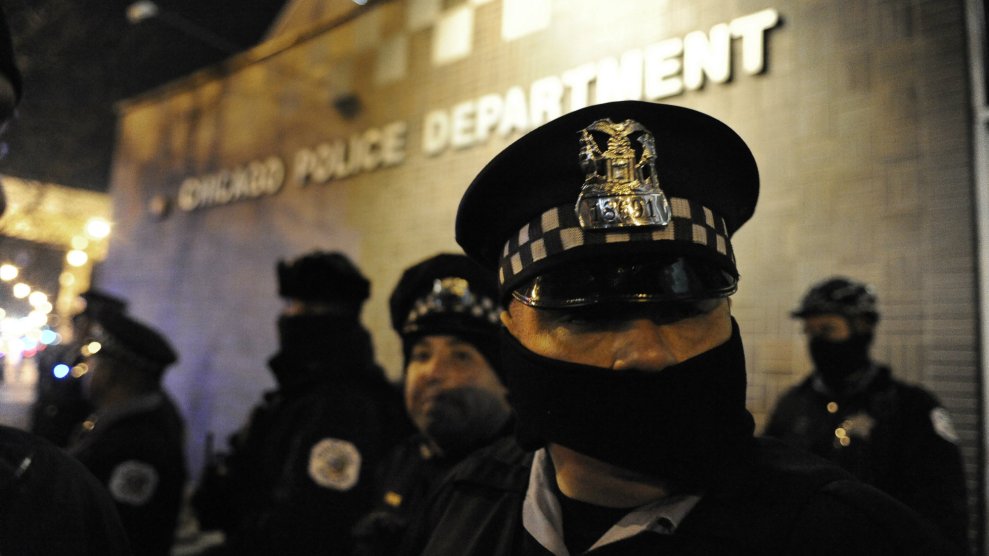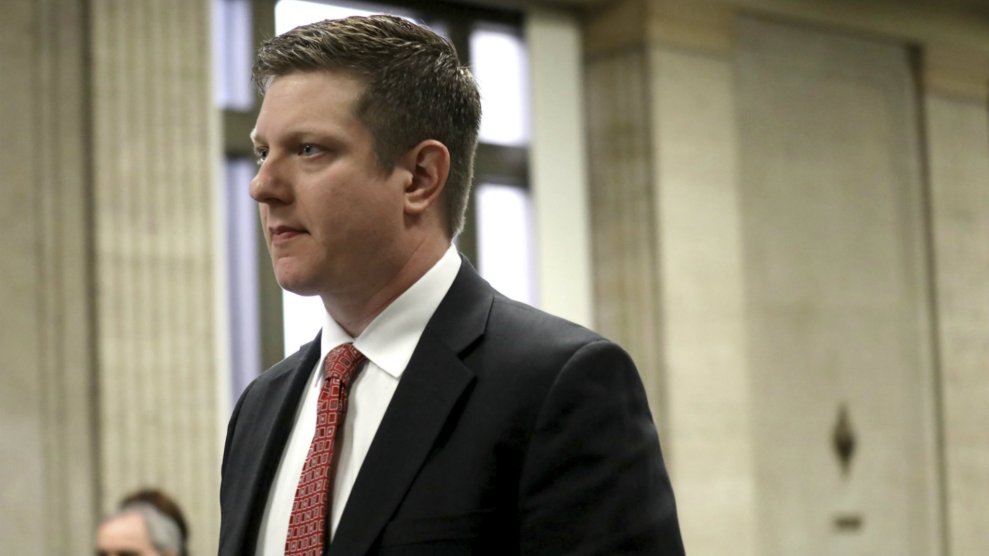
Chicago police officers outside department headquarters.Paul Beaty/AP
Back in January, after the Department of Justice released a scathing report on unconstitutional abuses by Chicago police officers, Mayor Rahm Emanuel agreed to negotiate a consent decree that would put a federal court in charge of overseeing police reform in the city. The report was the culmination of a lengthy investigation of police practices sparked by the fatal shooting of 17-year-old Laquan McDonald by a Chicago cop in 2014.
But Emanuel, who previously served as chief of staff for President Barack Obama, reneged on the agreement in June. Instead, he announced, he would seek a less stringent agreement with Attorney General Jeff Sessions, a deal that would not be legally binding. Groups have been suing the city ever since to force it to adhere to the spirit of Emanuel’s original agreement.
Sessions, who is determined to roll back Obama-era oversight efforts, has criticized consent decrees as “handcuffing the police.” Given the DOJ’s disinterest in policing the police, three separate lawsuits are demanding that Emanuel hammer out a consent decree directly with community members. Here’s a quick rundown.
Black Lives Matter Global Network: The local BLM chapter was the first to take legal action, filing a federal lawsuit against the city in June. Citing the department’s documented pattern of using violence against people of color, the suit calls for a court-enforceable pact with members of BLM, the local NAACP chapter, and other groups. “The city has proven that it would rather pay for its officers’ continued use of excessive force than remedy the underlying problems giving rise to the abuses in the first place,” the lawsuit stated. “Absent federal court supervision, nothing will improve.” In August, the city’s lawyers tried to get the suit dismissed, arguing that the department had already corrected the problems in question, instituting a new use-of-force policy and equipping more officers with body cameras and Tasers. (A recent analysis by the Chicago Reporter notes that the CPD has implemented only six of the DOJ’s 99 reform recommendations.) Attorneys for BLM are still weighing their response.
The Illinois attorney general: One week after the city asked for a dismissal of the BLM suit, state Attorney General Lisa Madigan filed a new lawsuit. The department’s reforms to date were “insufficient,” it said, to correct a “decades-long policy” of abuses. “Real, lasting” change will require court oversight, Madigan said at a press conference. At the same conference, after repeatedly arguing that reform could be accomplished without court oversight, Emanuel did an about face, saying the city would negotiate a consent decree with the AG’s office. But city attorneys have yet to drop their challenge to BLM’s nearly identical lawsuit. Madigan has said she’s reached out to lawyers for BLM to ensure that appropriate stakeholders are included in the negotiations. Christy Lopez, a former DOJ official who oversaw police reform efforts under Obama, told Mother Jones that Madigan’s suit is an example of how states can step in to replace a disengaged Justice Department. (California is the only other state where the attorney general is pursuing legal action against a police department for abuses.)
The ACLU: On Wednesday, the ACLU of Illinois, filed a third lawsuit—this one on behalf of people with disabilities—a category of people who are not mentioned in the other suits, but who are disproportionately affected by police abuses, says ACLU attorney Karen Sheley. The goal is to make sure people with disabilities also have a say, so “reform is executed in the fullest way possible” in any consent decree that comes out of the negotiations. Up to half of people killed by police nationwide have a physical or mental disability, the lawsuit says. In Chicago, it notes, people with disabilities are also disproportionately affected by nonlethal uses of force, such as Taserings. The ACLU plans to to connect with Madigan about including disability rights advocates in the negotiation process.















